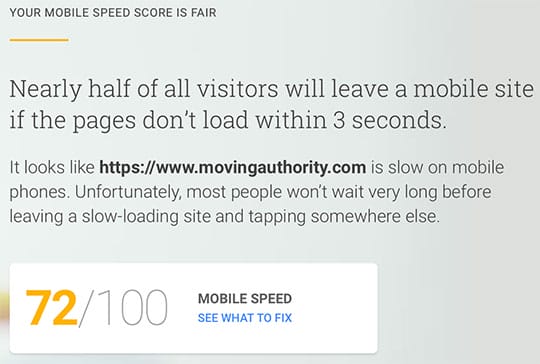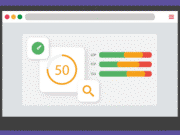Ever visit a website that was painfully slow? It’s safe to say that the majority of us have. Interestingly, most of us didn’t really start to care about site speed up until a couple of years ago. So what changed? That’s simple: Our attention span. With practically every person and their dog owning a smartphone and/or tablet. The world of “instant” everything has rapidly expanded, causing most users to have high expectations, especially as more advancements are constantly being introduced into the market. Additionally, many developers and web designers got ahead of the game by setting the bar quite high much earlier on, forcing others to try and catch up.
However, did setting the bar higher actually cause the change? Not necessarily. There are multiple contributing factors as to why site users prefer sites with practically instant loading times these days. Besides the fact that we live in a more instant world, a majority of people do almost everything imaginable online. One excellent example of this is the fact that 78% of consumers buy almost everything online. Most shoppers that prefer visiting a physical store will still try to look up or view a product online first. Making a good performing website an important aspect of your business, even if it’s just an online catalog or gallery.
The reasons you should have a fast loading website doesn’t end here either. Read more about why else site speed actually matters below.

Stop testing the patience of mobile users.
Data shows that if your website takes more than one minute to load, your bounce rate starts to skyrocket with each passing minute. Since most people use their mobile phones to visit a site, speed is important essential. Why? Because more often than not, consumers are using their phone to check/buy something while they are busy doing other things. They are looking to get what they need as fast as possible.
If you have Google Analytics or something similar and you see that visitors left your site at around the 2 or 3 seconds mark, this is a strong indicator that your website is WAY too slow for the needs of today’s mobile user.
What does a high bounce rate mean for you?
Money left on the table for the taking. In other words, that same user will find another site with the same/similar product/info and give them their time and money instead. High bounce rates show that few users care about how cool a website looks and care more about how it performs. In essence, they really just want to get on and off a site without delay or hassle because their attention span is low and their time is limited. So the less time they have to spend wrestling with a website, the better their experience, helping you cash in instead of your competitors.
What makes a website slow?

Plugins, plugins, and just way too many “flashy” features like badges and widgets. When you overload your site with too much fancy anything, it will make your site slower than a slug, much like some WordPress blogs, where we actually timed the loading times three different times and waited a painful 12 seconds for the site to load each time. Once you finally start getting some action on their website, you’ll see that they usually have a pretty cool site. However, 12 seconds is just WAY too long for any site to load, no matter how impressive the end result is.
Other possible contributing factors could include:
- A bad web host or just an upgrade to your package.
- Too many advertisements or popups on your site.
- Images that are not web-optimized and need to be optimized.
- Website scripts need to be minimized.
Google’s Algorithm is watching your every move.

Over the past year, Google’s Algorithm literally started taking everything your site does—or doesn’t do—into consideration when providing your website with a quality score. A low-quality score will stop your site from showing up in search results making both your on-page an off-page SEO effort a waste of time and money when you’re trying to rank your website.
The thing is, mobile rankings seem to matter most. Yet mobile site speed is much harder to improve compared to desktop speeds. Both do affect quality scores and last year; Google made mobile speed a top contributor to high or low mobile rankings. If your site is slow, your Google rank will be low. If you run a pay-per-click campaign with Google, your ads will not show up to mobile users at all if your mobile site speed is low. Again, more money left on the table or wasted.
How do you know if you have a low-quality score with Google?
Unfortunately, Google doesn’t share your quality score and only tells you what may be affecting your site’s overall quality score. Often, they will inform you that your mobile speed may not be very good and to check your site speed across all devices by using the Google Site Speed Test. They will then tell you what your site speed and performance scores are and offer to provide you with a free report that shows you what you need to do in order to fix your site speed issues. Google also scores each aspect of your site’s performance out of 100.
For example, we tested out https://www.movingauthority.com/ and here’s how they scored:

Mobile Friendliness: 100/100 (this pertains to the layout and responsiveness of the theme).
Mobile Speed: 72/100 (This isn’t a terrible score, but according to Google, this is a fair score and considered too slow for Google’s mobile algorithm, so yes, not a good score for you.)
Desktop Speed: 78/100 (Again, not a bad score, but still too slow for Google and considered to be a fair quality score. Interestingly, the site loads quite fast in comparison to a lot of websites).
Conclusion

If your quality score with Google is weak, then your site will struggle to show up in search results making it more difficult for users to find you. If and when they do come across your site, visitors may have a less than desirable experience, which could cost you money in sales and wasted money on advertising and SEO efforts. So yes, website speed actually does matter and should be every website owner’s number one priority.





